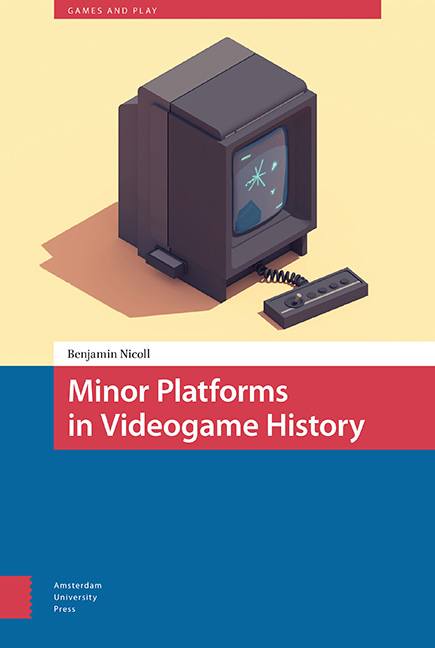Book contents
- Frontmatter
- Contents
- List of Tables and Figures
- Acknowledgements
- Introduction : Failed, Forgotten, or Overlooked? Methods for Historicizing Minor Platforms
- 1 Ways of Seeing Videogame History: The Vectrex as a Transitional Platform
- 2 Articulations of Videogame Piracy: The Zemmix as a Decolonial Platform
- 3 Domesticating the Arcade: The Neo Geo as an Imaginary Platform
- 4 A Dialectic of Obsolescence? The Sega Saturn as a Residual Platform
- 5 ‘How History Arrives’: Twine as a Minor Platform
- Conclusion: ‘Something new in the Old’
- Index
2 - Articulations of Videogame Piracy: The Zemmix as a Decolonial Platform
Published online by Cambridge University Press: 21 November 2020
- Frontmatter
- Contents
- List of Tables and Figures
- Acknowledgements
- Introduction : Failed, Forgotten, or Overlooked? Methods for Historicizing Minor Platforms
- 1 Ways of Seeing Videogame History: The Vectrex as a Transitional Platform
- 2 Articulations of Videogame Piracy: The Zemmix as a Decolonial Platform
- 3 Domesticating the Arcade: The Neo Geo as an Imaginary Platform
- 4 A Dialectic of Obsolescence? The Sega Saturn as a Residual Platform
- 5 ‘How History Arrives’: Twine as a Minor Platform
- Conclusion: ‘Something new in the Old’
- Index
Summary
Abstract
This chapter analyses the Zemmix, a South Korean pirate platform released by Daewoo in 1985. In its technical construction, the Zemmix makes (unofficial) use of a microcomputer operating system known as ‘MSX’. MSX was co-developed by Microsoft's Japanese and North American hardware divisions in the 1980s. It therefore carried a ‘double bind’ (Cho, 2016) of neocolonial influence in Korea. Through the Zemmix, however, MSX became an object of decolonization in Korea's videogame and computer industries. I argue that the Zemmix is useful as an epistemic tool or ‘theoretical object’ (Verhoeff, 2012) for reflecting on the ‘postcolonial consciousness’ that became articulated in Korea's videogame and computer industries during this era.
Keywords: Zemmix, South Korean videogame history, videogame piracy, decolonial computing, MSX
It is often argued that videogames became a ‘global’ commodity in the 1980s, precipitated by the collapse of the North American videogame industry and its subsequent revival by Nintendo. This argument can, however, be critiqued for its implicit focus on the North American and Japanese home console markets and, by extension, for overlooking the many ‘microcomputer’ industries that spearheaded the emergence of videogame development scenes in Europe, South America, and Australasia during this period. Such a critique takes its cue from cultural theory, which has long recognized that narratives of neocolonialism and hegemonic expansion do not adequately account for the complex inter- and intraregional flows of globally branded technologies in non-Western contexts. Such technologies are often subject to local ‘articulations’ of use, reception, and appropriation as they circulate regional markets. Rather than adopting what Bjarke Liboriussen and Paul Martin (2016: n.p.) call a ‘centre-periphery model of power’, in which ‘a hegemonic centre dominates its periphery’, a regionally informed approach to videogame history is concerned with the ways in which minor narratives exist within, against, and alongside higher-order globalizing processes and discourses.
In the 1980s, a number of informal videogame industries emerged in response to the global spread of North American and Japanese videogames. These informal industries were particularly concentrated in East Asian countries such as China, Taiwan, and South Korea (henceforth Korea). This chapter looks at the formation and formalization of Korea's informal videogame industry in particular, through the lens of a ‘decolonial platform’ known as the Daewoo Zemmix.
- Type
- Chapter
- Information
- Minor Platforms in Videogame History , pp. 73 - 104Publisher: Amsterdam University PressPrint publication year: 2019



